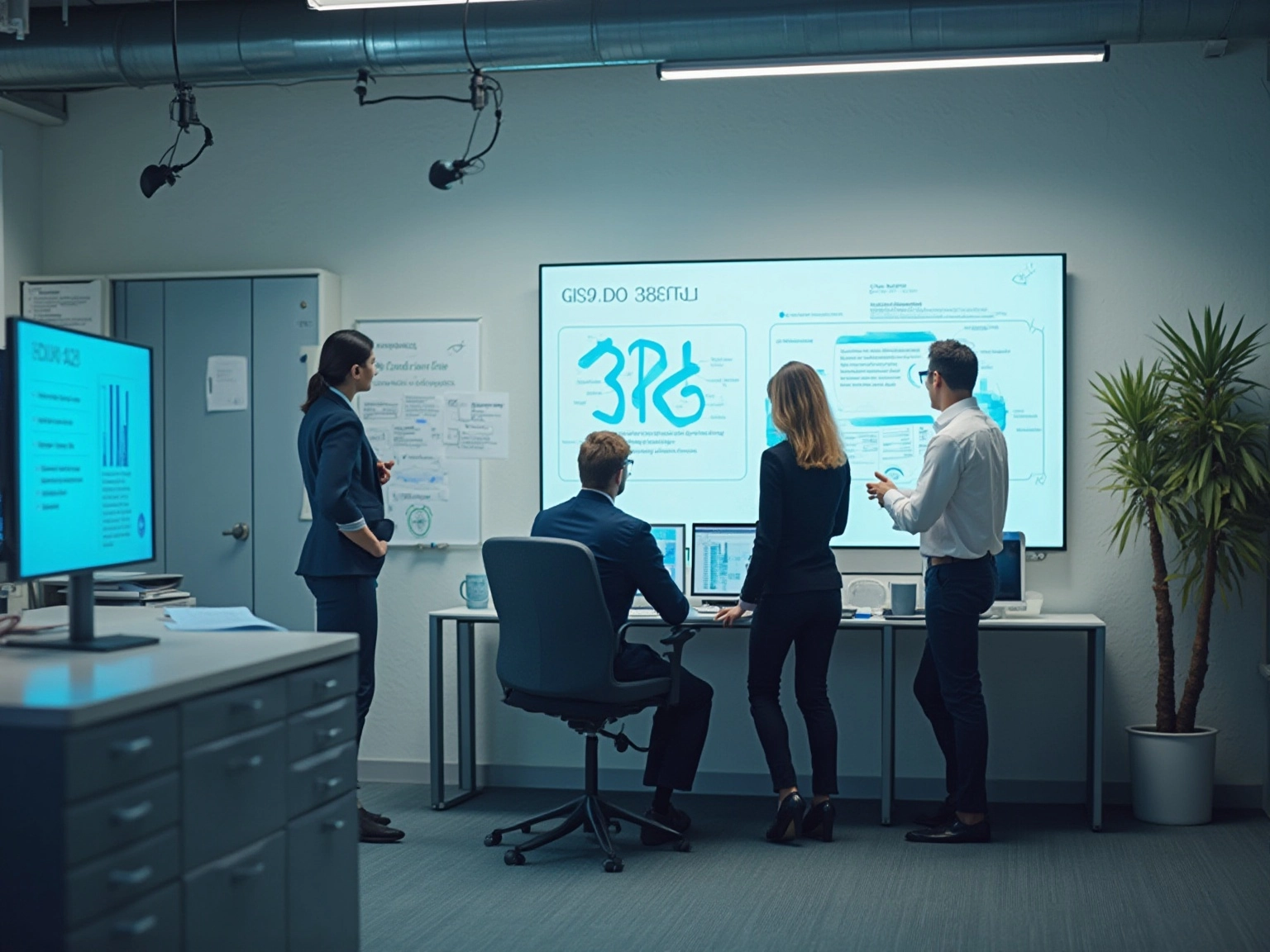Overview
Choosing and implementing a document management solution (DMS) is crucial for accounting firms aiming to enhance operational efficiency, ensure compliance, and improve client engagement.
The challenges accounting managers face in managing sensitive financial data are significant; however, the right DMS can effectively address these issues.
This article outlines key steps for successful implementation, including:
- Defining objectives
- Selecting the right solution
- Providing ongoing training and support
These steps collectively foster a collaborative work environment while tackling the unique demands of the accounting industry.
By prioritising a DMS, firms position themselves for greater success and improved client relationships.
Take action now to transform your firm’s document management practices.
Key Highlights:
- Document management solutions (DMS) enable accounting firms to organise, store, and monitor electronic files and images of paper data, streamlining workflows and ensuring compliance.
- Key features of DMS include record capture, indexing, version control, and access control, which enhance operational efficiency and data security.
- Over 50% of accounting executives believe automated accounting systems will transform the industry in the next 30 years, highlighting the need for effective record handling strategies.
- Glasscubes, a DMS, has helped firms like TaxAssist Accountants save significant time and improve client engagement through automated reminders and real-time reporting.
- Accounting firms face unique challenges in DMS implementation, including regulatory compliance, data security, collaboration, and efficiency.
- Essential features for DMS include automated workflows, advanced search capabilities, integration with existing systems, mobile access, and audit trails for compliance.
- To implement DMS effectively, firms should define objectives, select the right solution, plan implementation, train staff, and monitor performance.
- Common challenges in DMS implementation include resistance to change, integration issues, and data migration challenges, which can be mitigated through training and support.
- Ongoing training and support are crucial for successful adoption, enhancing user confidence and ensuring the system’s full potential is utilized.
- The benefits of DMS include increased efficiency, improved client engagement, enhanced compliance, and cost savings, making them essential for modern accounting practices.
Introduction
In the competitive landscape of accounting, firms are increasingly recognising the pivotal role that document management solutions (DMS) play in enhancing operational efficiency and client engagement.
As the industry evolves, the need for effective systems to organise, store, and track documents has never been more critical.
With over half of accounting executives predicting a transformative shift towards automated and intelligent accounting systems in the next three decades, the urgency for firms to adopt robust document management strategies is clear.
This article delves into the essential components, unique challenges, and strategic implementation of DMS tailored specifically for accounting firms, highlighting how solutions like Glasscubes can streamline workflows, ensure compliance, and ultimately drive business success.
Understanding Document Management Solutions: A Primer for Accounting Firms
Document management solutions are essential software systems that empower accounting firms to efficiently organise, store, and monitor both electronic files and images of paper-based data. These systems are pivotal in streamlining workflows, enhancing collaboration, and ensuring compliance with regulatory standards. A comprehensive understanding of the capabilities of document management solutions—such as content capture, indexing, and retrieval—is crucial for companies aiming to boost operational efficiency.
Research indicates that over 50% of accounting executives anticipate that the evolution of automated and intelligent accounting systems will significantly transform the industry over the next 30 years. This underscores the urgency for companies to adopt effective record handling strategies, such as those offered by Glasscubes, specifically designed to meet these evolving requirements.
Key Components of Record Handling Solutions
- Record Capture: This feature empowers organisations to scan and digitise paper files, facilitating a seamless transition to electronic records.
- Indexing: Proper indexing organises files for rapid retrieval, which is vital for maintaining productivity in fast-paced accounting environments.
- Version Control: This component ensures that all file revisions and updates are meticulously tracked, preventing confusion and maintaining accuracy in customer records.
- Access Control: By restricting access to sensitive files, organisations can safeguard confidential information, a critical aspect given that 66% of staff reportedly use free file-sharing platforms, heightening the risk of data breaches.
Familiarising themselves with these components enables accounting organisations to assess their specific needs and the potential advantages of implementing a document management solution. Successful implementation of a document management solution can yield substantial productivity gains; for instance, organisations utilising innovative document management solutions like Glasscubes have reported significant time savings. Sophie Montgomery of TaxAssist Accountants noted that her organisation saved an impressive 288 hours in just one tax season, highlighting how Glasscubes enhances efficiency in document management through features like automated reminders and real-time reporting.
Moreover, Glasscubes improves engagement by streamlining information gathering and communication. With automated reminders and a user-friendly platform, accounting businesses can reduce response times by 50% and boost client interaction by 40%. The secure, encrypted, and GDPR-compliant nature of Glasscubes ensures that organisations can uphold high standards of data protection while enhancing their operational processes.
Additionally, Glasscubes effectively prevents information from being misplaced or overlooked in busy inboxes, addressing a significant pain point for accounting businesses. The integration of advanced technologies, such as blockchain, is increasingly being adopted to enhance data security and compliance within information handling systems. Glasscubes integrates such advancements, guaranteeing that companies can maintain elevated levels of data security while improving their operational procedures.
In 2025, the landscape of file handling solutions for accounting businesses will likely continue to evolve, emphasising automation and intelligent systems that not only enhance efficiency but also improve customer satisfaction. By utilising a document management solution that incorporates advanced features, such as visual progress reports providing real-time insights into outstanding requests, accounting agencies can transform their handling processes, ultimately leading to enhanced operational efficiency and customer engagement.
Identifying the Unique Needs of Accounting Firms in Document Management
Accounting firms encounter distinctive challenges in implementing a document management solution that can significantly impact their operations. These challenges include:
- Regulatory Compliance: Firms must navigate stringent regulations regarding data retention and privacy, which are essential for maintaining client trust and avoiding penalties. For instance, the recent collaboration between EY and AuditBoard to launch a UK Centre of Excellence underscores ongoing efforts to modernise risk oversight and compliance in response to these challenges.
- Data Security: Protecting sensitive financial information from unauthorised access and potential breaches is critical, particularly in an era where cyber threats are increasingly sophisticated. The announcement of TOA Global providing US-trained accounting teams and enterprise-grade cybersecurity solutions highlights the importance of robust security measures in management. Glasscubes guarantees GDPR compliance, offering reassurance for companies and their consumers regarding data protection.
- Collaboration: Efficient communication and information sharing among team members and clients are vital for sustaining workflow efficiency and ensuring alignment. Notably, statistics reveal that 66% of personnel utilise free file-sharing platforms like WhatsApp and Google Drive to manage files, which can introduce security risks and inefficiencies. Glasscubes addresses these concerns by offering a secure, user-friendly platform that streamlines the request and transfer of information, ensuring that all correspondence is contained within each audit request and enhancing overall communication. The platform also provides real-time visual progress updates, enabling companies to effectively monitor pending requests and inquiries.
- Efficiency: Minimising the time spent on information retrieval and processing is crucial for enhancing productivity and allowing accountants to focus on value-added activities. Glasscubes transforms client interaction by automating reminders and tracking pending requests, significantly improving response rates and reducing processing times for personal tax and payroll oversight.
To accurately determine their file handling requirements, firms should conduct a thorough evaluation of their existing practices. This process should encompass:
- Evaluating Existing Workflows: Identify bottlenecks in current file handling processes to pinpoint areas for improvement.
- Gathering Staff Feedback: Collect insights from team members regarding their challenges in information handling, revealing critical areas for enhancement. As Helen Lovering, Associate Director, observes, many accountancy professionals are seeking opportunities in smaller organisations where they can develop a broader skill set and gain more exposure.
- Analysing Compliance Requirements: Review the specific compliance obligations relevant to the accounting sector to ensure that any selected information handling solution aligns with these standards.
By thoroughly understanding these unique needs, accounting firms can select a Document Management System (DMS) that not only meets their operational requirements but also drives overall productivity and client satisfaction. Craig Hyslop, who leads the Glasscubes Customer Success Department, brings over 30 years of experience to assist companies in succeeding with collaborative technology, emphasising how his expertise enhances the effectiveness of Glasscubes in addressing the needs of accounting practices.
Essential Features of Document Management Solutions for Accountants
When selecting a document management solution, accounting firms must prioritise essential features that drive efficiency and security.
- Automated Workflows are crucial for streamlining document approval processes and minimising manual tasks. Automation not only enhances efficiency but also significantly reduces the time spent on routine handling, allowing accountants to focus on more strategic activities. For instance, Glasscubes exemplifies this with its automated reminder feature, capable of sending an unlimited number of reminders on a customisable schedule. This ensures timely data submission and can reduce response times by up to 50%. Firms implementing such automated workflows report a notable increase in productivity. Alarmingly, 66% of staff currently rely on free file-sharing platforms, which pose cybersecurity threats, underscoring the necessity for secure management solutions. Workflow automation in Financial Cents, for example, enables automatic categorisation of customer files and alerts for file actions, showcasing practical applications of this feature.
- Advanced Search Capabilities are vital for quick file retrieval, maintaining workflow efficiency. Advanced search functionalities, including keyword searches and filters, empower accountants to swiftly locate necessary files, thereby minimising downtime and enhancing response times to client inquiries.
- Integration with Existing Systems is another critical aspect. A document management solution must seamlessly integrate with the accounting software and other tools already in use within the firm. This compatibility ensures smooth data flow between systems, enhancing overall operational efficiency.
- Mobile Access has become essential in today’s fast-paced environment. The ability for staff to access files remotely enhances flexibility and responsiveness, enabling accountants to manage client needs and requests from anywhere, ultimately improving client engagement.
- Audit Trails are indispensable for compliance, a top priority for accounting firms. A robust file administration system should offer extensive audit trails that log file access and changes. This feature not only supports regulatory compliance but also instills confidence in customers regarding the security of their sensitive information.
Despite the clear advantages, many companies face challenges in implementing paperless record handling solutions, such as regulatory concerns and customer reluctance. A case study revealed that 33% of companies cited regulation as a barrier, while 45% of customers preferred paper records for perceived security reasons, indicating a pressing need for education on digital solutions. As Eliisa M., an Accounting Team Lead, noted, “it provides a good overview of people’s working hours, which also enables better budgeting.”
By focusing on these characteristics, companies can ensure that their file organisation systems enhance efficiency, security, and compliance, ultimately leading to greater client satisfaction and streamlined operations. With Glasscubes, a secure and user-friendly platform, firms can eliminate the confusion of endless email threads and embrace a structured tool that fosters organised communication and real-time visibility into audit processes.

Ensuring Compliance and Security in Document Management for Financial Data
Adherence and security are pivotal components of management systems for accounting firms. To effectively safeguard sensitive information and comply with regulatory standards, organisations must implement the following strategies:
- Implement Strong Access Controls: Establish role-based permissions to restrict access to authorised personnel only. This minimises the risk of unauthorised access and ensures that sensitive information is accessible solely to those who require it.
- Utilise Encryption: Employ robust encryption methods to protect sensitive data both in transit and at rest. This is crucial for preventing unauthorised access and ensuring client information remains confidential.
- Regularly Update Security Protocols: Remain vigilant against evolving security threats by routinely updating security measures and protocols. This proactive approach aids in mitigating risks associated with data breaches and cyberattacks.
- Conduct Compliance Audits: Regularly review and evaluate record-keeping practices to ensure adherence to relevant regulations, such as GDPR and other data protection laws. These audits help identify potential weaknesses and reinforce compliance with legal obligations.
In 2025, the emphasis on compliance and security in document management solutions for accounting records is more pronounced than ever. Statistics reveal that the software market for records in North America is valued at £2.79 billion, underscoring the growing significance of efficient document management solutions. Trends such as AI integration and cloud-based document management are shaping the future of record handling, empowering companies to enhance their operational efficiency and security protocols.
Organisations that prioritise these factors not only protect their customers’ sensitive information but also bolster their reputation within the sector. As Sophie Montgomery from TaxAssist Accountants noted, users of Glasscubes reported an impressive 288 hours saved in just one tax season, highlighting the platform’s effectiveness in enhancing customer engagement through automated communication and information-gathering tools.
Expert opinions underscore the necessity of robust data protection measures in accounting firms. Industry leaders advocate for best practices that include regular training for staff on security protocols and the implementation of comprehensive data protection strategies. By adopting these practices, companies can significantly reduce the risk of data breaches and ensure the integrity of their document management solutions.
Case studies, such as those from Secureframe, illustrate the tangible benefits of prioritising compliance and security. Users of Secureframe reported a 97% improvement in their security posture and an 89% acceleration in compliance processes, demonstrating the effectiveness of streamlined compliance practices. By integrating these strategies, accounting firms can create a secure environment for managing sensitive materials with a document management solution, ultimately fostering trust and confidence among their clients.
Moreover, Glasscubes distinguishes itself by optimising workflows and enhancing client satisfaction through its user-friendly interface and dedicated onboarding support, making it an indispensable resource for accountants seeking to refine their record-handling techniques while ensuring compliance with privacy regulations.

Steps to Successfully Implement a Document Management Solution in Your Firm
Introducing a document management solution (DMS) is a strategic action that can significantly enhance the operational efficiency of accounting businesses. To ensure a successful transition, consider the following key steps:
- Define Objectives: Begin by clearly outlining the goals for the new DMS. Common objectives include improving workflow efficiency, enhancing file security, and facilitating better collaboration among team members. For instance, companies may strive to decrease retrieval times for materials or enhance client communication processes. Notably, a survey by Thomson Reuters found that 69% of respondents ranked improving current workflows and processes as a top priority.
- Select the Right Document Management Solution: Choose a document management solution that aligns with the defined objectives and meets the specific needs of the firm. Essential features to consider include user-friendliness, integration capabilities with existing software, and robust security measures. The worldwide market for accounting file handling software is anticipated to attain £11.8 billion by 2025, emphasising the increasing significance of choosing a suitable solution that can adapt to industry requirements. Glasscubes stands out with its effortless onboarding experience, requiring no training and providing personalised setup assistance during the onboarding call, ensuring that teams can quickly adapt to the platform. Key features such as secure file sharing, automated reminders, and enhanced client engagement tools further streamline accounting workflows.
- Plan the Implementation: Develop a comprehensive implementation plan that outlines timelines, responsibilities, and resource allocation. This plan should also address potential challenges, such as the 27% of businesses that cite spiralling costs as a barrier to adopting paperless office tools. A well-structured document management solution can help mitigate these issues and facilitate a smoother transition.
- Train Staff Effectively: Comprehensive training is crucial for ensuring that all team members are comfortable and proficient with the new document management solution. This training should address not only the technical aspects of the DMS but also optimal practices for handling files. Engaging staff in the training process can lead to higher adoption rates and more effective use of the system. With Glasscubes, most teams are able to expertly navigate the portal after the initial onboarding call, minimising the need for extensive training.
- Monitor and Evaluate: After implementation, it is essential to regularly assess the system’s performance and gather feedback from users. This ongoing evaluation allows companies to make necessary adjustments and improvements, ensuring that the DMS continues to meet evolving needs. Statistics indicate that 69% of IT decision-makers plan to increase their cybersecurity budgets annually, underscoring the importance of maintaining robust security protocols within the DMS.
By following these steps, accounting firms can effectively implement a document management solution that enhances efficiency and fosters a more organised and collaborative work environment. Case studies, like ‘Enhanced Cooperation in Accounting Practices,’ illustrate how Glasscubes enables seamless sharing and access to files, greatly improving team collaboration and project coordination. Furthermore, the dangers linked to a deficiency of organised file handling procedures, as emphasised by the case study named ‘Lack of Document Handling Processes,’ strengthen the necessity for efficient solutions like Glasscubes to sustain competitiveness in the market.

Common Challenges in Document Management Implementation and How to Overcome Them
Implementing a document management solution (DMS) in an accounting office can present several challenges that must be navigated effectively:
- Resistance to Change: One of the most significant hurdles is the reluctance of staff to embrace new technology. This resistance often stems from a fear of the unknown or a belief that existing processes are sufficient. Involving team members in the selection process is crucial, allowing them to voice their concerns and preferences. Comprehensive training and demonstrating the benefits of the new system can also ease the transition. Notably, 88% of respondents recognise technology as a key driver of workplace efficiency and enhanced client service, highlighting the potential for improved client service when new systems are adopted. Platforms like Glasscubes not only provide dedicated onboarding assistance but also enable streamlined communication and real-time reporting, promoting a more organised and efficient process for accounting businesses, further easing the transition.
- Integration Issues: Another common challenge is the difficulty in integrating the document management solution with existing systems. Compatibility should be a primary consideration during the selection phase to ensure a seamless transition. Firms should conduct thorough assessments of their current technology landscape and select a document management solution that can easily integrate with their existing tools. This proactive method can greatly lessen integration difficulties in the future.
- Data Migration Challenges: The process of transferring existing files to the new system can be complex and time-consuming. A well-defined migration plan is essential to ensure that all data is accurately and efficiently transferred. In certain instances, engaging professional services may be advantageous to navigate this process seamlessly and prevent potential pitfalls.
By foreseeing these challenges and preparing a document management solution beforehand, accounting organisations can facilitate a more streamlined implementation process. For example, companies that have effectively embraced file organisation solutions, like those utilising Glasscubes, have reported substantial enhancements in efficiency, including a 50% decrease in response times and a 40% rise in customer response rates. Users have noted that clients appreciate the transparency Glasscubes provides, allowing them to see outstanding information at a glance, which enhances engagement and accelerates the audit process.
Furthermore, users like Sophie Montgomery from TaxAssist Accountants reported saving 288 hours in just one tax season, illustrating the real-world impact of adopting such solutions. These outcomes underscore the importance of addressing common challenges head-on to fully leverage the benefits of a document management solution. Additionally, Glasscubes has been very supportive during the setup process, responding promptly to any questions, which enhances the overall user experience and satisfaction.
Training and Support: Key to Successful Adoption of Document Management Solutions
To ensure the successful adoption of a document management solution, accounting firms must focus on several key strategies:
- Develop a Comprehensive Training Programme: Tailor training sessions to accommodate various user roles within the firm. This approach ensures that all staff members, from junior accountants to senior management, understand how to navigate and utilise the system effectively. A well-structured training programme not only enhances user proficiency but also fosters a culture of confidence in using new technologies. Firms that have implemented comprehensive training programmes have observed significant improvements in user engagement and satisfaction, ultimately leading to more efficient workflows and enhanced client service.
- Provide Ongoing Support: Establish a robust support system that allows users to seek assistance and resolve issues as they arise. This could include dedicated help desks, online resources, or regular check-ins with IT support. Ongoing support is essential, as it addresses the common concerns employees have regarding the security and accuracy of sharing files, which can often be compromised through traditional methods like email. A case study titled “Challenges in Document Sharing” highlights that many employees express concerns about the security and accuracy of information shared through traditional methods, underscoring the need for dedicated document management solutions. With Glasscubes, the automated reminder feature enables companies to send up to 10 reminders on a simple schedule, or an unlimited number of reminders with any frequency or on specific days of the year. This feature enhances client engagement by allowing companies to customise messages for each reminder, indicating greater urgency to meet upcoming deadlines, and ensuring that important deadlines are met without the confusion of long email trails.
- Encourage Feedback: Create open channels for staff to provide input on the information handling system. This feedback loop is essential for continuous improvement, allowing firms to adapt the system to better meet user needs and enhance overall functionality.
Focusing on training and assistance not only enhances user confidence but also guarantees that the information system is utilised to its full potential. Companies with high-cloud maturity, which often includes effective document management solutions, report that 89% are successfully achieving their business goals. Furthermore, as noted by Sophie Montgomery of TaxAssist Accountants, businesses can save substantial time—reporting an impressive 288 hours saved in just one tax season—when they effectively implement these solutions.
Additionally, it is important to recognise that 27% of businesses identify spiraling costs as a main roadblock to implementing paperless office tools, highlighting the necessity of training and support to mitigate such challenges. By utilising a user-friendly interface that requires no training, such as that provided by Glasscubes, organisations can optimise workflows and improve customer satisfaction while ensuring that their teams are well-equipped to use the system effectively. This transformation in customer information requests not only streamlines processes but also significantly reduces the inefficiencies previously experienced with email communications.

The Benefits of Document Management Solutions: Enhancing Efficiency and Client Engagement
Introducing a records management solution (RMS) presents numerous advantages for accounting businesses, particularly in 2025, where effectiveness and client interaction are paramount. The key benefits include:
- Increased Efficiency: Automating document workflows significantly reduces manual tasks, enabling staff to focus on higher-value activities. Firms utilising advanced document management solutions like Glasscubes have reported efficiency gains that result in considerable time savings. An audit manager from MGI highlighted that using Glasscubes has streamlined their audit process, facilitating quicker responses from customers and minimizing the time spent on managing information requests.
- Improved Engagement: A document management solution enhances communication and collaboration with customers, leading to a more satisfying overall experience. With features such as automated reminders and real-time reporting, Glasscubes ensures timely responses. The MGI audit manager noted a marked increase in client engagement, with clients valuing the transparency of having all information in one secure workspace. This has resulted in faster uploads of necessary files and a more structured approach to information collection.
- Enhanced Compliance: Maintaining organised records and comprehensive audit trails simplifies adherence to regulatory requirements. This aspect becomes increasingly critical as companies navigate complex compliance landscapes, ensuring that all documentation is readily accessible and properly managed.
- Cost Savings: Transitioning to a document management solution like Glasscubes lessens reliance on paper and reduces storage costs, leading to significant long-term savings. Over 10,000 firms have already adopted advanced file handling solutions, underscoring the financial benefits that can be realised. Furthermore, with 69 percent of IT decision-makers planning to increase their budgets for cybersecurity, the importance of secure document management solutions in safeguarding sensitive information cannot be overstated.
Recognising these benefits empowers accounting organisations to construct a compelling case for implementing a document management solution, ultimately enhancing operational efficiency and customer satisfaction. Expert insights suggest that integrating emerging technologies, such as machine learning, will further enhance the operational efficiency of DMS, positioning them as indispensable tools for modern accounting practices. The case study of Glasscubes exemplifies this effectiveness, demonstrating how firms utilising the platform have achieved notable improvements in communication and efficiency, as reflected in the positive feedback from clients who appreciate the streamlined process.

Conclusion
The significance of document management solutions (DMS) in accounting firms is paramount. As detailed in this article, DMS such as Glasscubes offer vital functionalities, including document capture, indexing, and automated workflows that streamline operations and enhance efficiency. With over half of accounting executives foreseeing a transition to automated systems, the imperative for firms to adopt robust DMS strategies is more pressing than ever.
The distinct challenges confronting accounting firms—ranging from regulatory compliance to data security and the necessity for seamless collaboration—underscore the need for customised document management solutions. By tackling these challenges with appropriate tools, firms can markedly boost productivity and enhance client engagement. The integration of features such as access controls, encryption, and audit trails not only protects sensitive data but also guarantees compliance with industry standards.
Furthermore, the successful implementation of a DMS relies heavily on thorough training and support. By investing in user education and fostering an environment that encourages feedback, firms can bolster user confidence and maximise the advantages of their chosen system. As evidenced by firms that have adopted Glasscubes, the potential for heightened efficiency and improved client interactions can result in significant time savings and operational enhancements.
In conclusion, adopting advanced document management solutions is crucial for accounting firms aiming to excel in a competitive environment. By harnessing the capabilities of DMS, firms can refine their workflows, ensure data security, and ultimately enhance client satisfaction. As the accounting industry progresses, those who prioritise effective document management will be strategically positioned for success in the years ahead.
